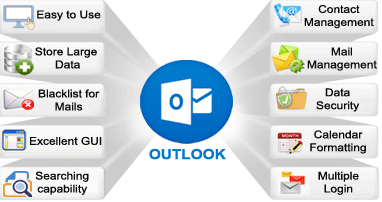Searching for Better Email Client Application?
Outlook is the Solution
Microsoft Outlook is a particular data chief from Microsoft. It is accessible as a piece of the Microsoft Office suite you do not require to pay extra charges for buying it. It is mostly create as Email provision with the characteristics like mail, contact, timetable, undertaking, schedule, diary, notes and web perusing. It utilized as a stand-alone requisition. What's more additionally fit to work with Microsoft Exchange Server for numerous clients in an association, for sending and receiving documents. MS Outlook use PST (Personal Storage Table) file format which is of two types ANSI and Unicode. ANSI use in the Outlook 97 to 2002.Because of its disadvantages of not supporting special characters and other language words it changes with Unicode, which is use in 2003 to 2013.
Version of Outlook
| Name | Version Number | Size | Release Date |
| Outlook 97 | 8.0 | 2 GB | 1997 |
| Outlook 98 | 8.5 | 2 GB | 1998 |
| Outlook 2000 | 9.0 | 2 GB | 2000 |
| Outlook 2002 | 10 | 2 GB | 2001 |
| Outlook 2003 | 11 | 4 GB | 2003 |
| Outlook 2007 | 12 | 20 GB | 2007 |
| Outlook 2010 | 14 | 50 GB | 2010 |
| Outlook 2013 | 15 | Upto Hard disk capacity | 2013 |
Features of MS Outlook
- Unlimited storage space for mails and their attachments.
- If you feel that any site which is not trustworthy and you have need to use your email address then Outlook provides you the option to use disposal Id without showing your primary address.
- It provides you a blacklist for ignoring Emails from particular email id or any Domain.
- It has very beautiful GUI, it also offers good speed.
- It has very good ability to search your documents quickly.
- It has few enhanced security features to protect your email account from predators and from unexpected Emails that may spoil your system.
- It provides you the better option of Email management in which you can manage your personal data as you want.
- It provide you many options to format you text item like change the size, color, style of the text.
- It also allows calendar formatting.
- You can create toolbar, add button, menu in which you can add command as per your requirement.

How Outlook Consider Being Superior to Lotus Notes?
The performance is better in various aspects of Outlook in comparison with Lotus Notes as we find characteristics like:-
- Reduce the need of having technical knowledge about software related things which is need in Lotus Notes.
- Cost effective in maintenance charges.
- Allow access of account everywhere.
- Users manage many accounts at the same time.
- For better understanding and utilization of Outlook, it provides very easy to use GUI.
So, we have numerous reasons for changing Lotus Notes to Outlook. And this is the reason why people think get sovereignty from limitation of Lotus Notes through switching to Outlook. It is better in many aspects. There are many External utility tools are available that migrates NSF documents to PST file of Outlook without losing single item of important document. So think about moving towards better opportunity.